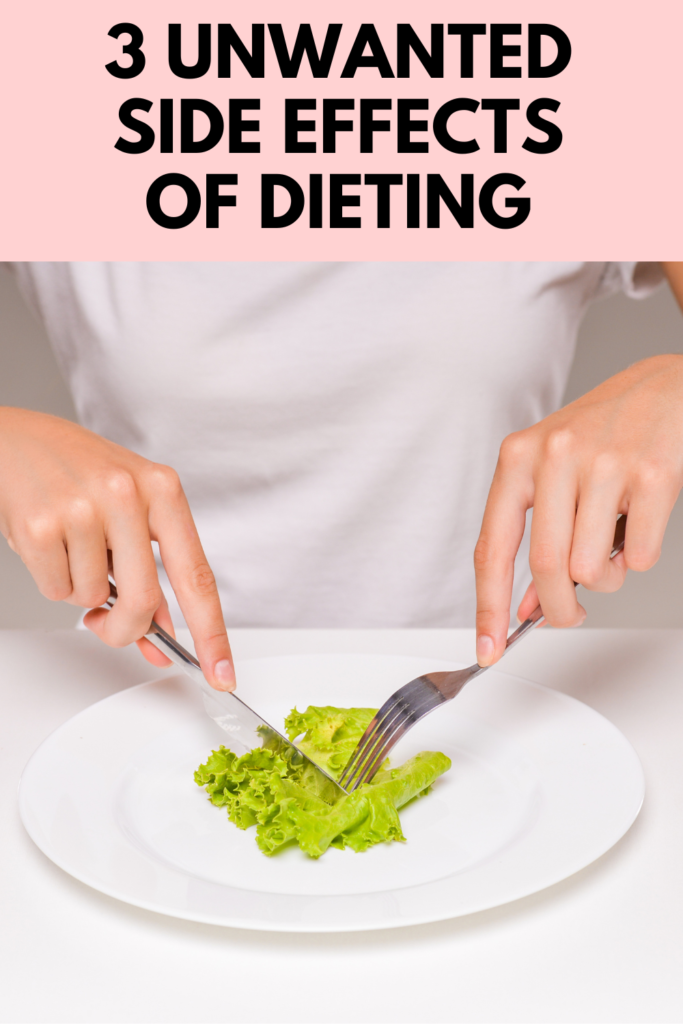3 Unwanted Side Effects of Dieting
If you knew that you’d have unwanted side effects of dieting, would you still choose to go on a diet? These are 3 things you may not know happen when you diet…

Here’s some food for thought as we enter summer diet season…
- Dieting can suppress your metabolism
- Most dieters GAIN WEIGHT over time… and more weight than their baseline (Mann et al. 2007)
- Dieting increases cravings and binges
- Dieting is linked to eating disorders
- Yo-yo dieting can shorten your lifespan (Lee et al. 1992)
Are these unwanted side effects of dieting what you expected when you signed up to do another round of Whole30?
Or Noom?
I don’t think so!
But these unwanted side effects of dieting are the reality of what happens when you go on a diet.
If you’re like most of my clients, your goal of starting your umpteenth diet is to lose weight. I get it, our society puts this insane pressure on you to lose weight to fit the “ideal.” However, what starts off innocently enough can lead to both physical and mental health complications.
Why do these unwanted side effects of dieting occur?
No one begins a diet thinking of the undesirable side effects. However, years of evidence-based research shows that many people who start a diet have an unwanted side effect.
Dieting can suppress your metabolism and lead to weight gain over time
Study after study shows that dieting lowers your metabolism. A slower metabolism leads to weight gain over time. Why does this occur? There are a few reasons why dieting leads to a slower metabolism:
1 . Caloric restriction puts your body in survival mode
This dates back to the years of feast and famine. In order to survive, you needed to suppress your metabolism so your body didn’t require as much energy. As such, when you restrict your calories (even on purpose), your body conserves energy by lowering your metabolism.
2. Dieting can lead to a loss of muscle mass
Your muscle mass is your most metabolically active tissue in your body. When you lose muscle, you burn fewer calories throughout the day. Over time, this leads to weight gain.
Even if a diet promises to “preserve lean muscle mass,” this is very difficult to do if you’re not eating enough.
Dieting leads to more cravings and binges
If you’re a long-time blog reader, then you probably already know this one. Whenever you restrict yourself from a food, you want it more (hence the cravings). Over time, this can lead to binging because your “willpower” gives out.
Excessive cravings and binges are unwanted side effects of dieting because they make you feel out of control around food. When your willpower snaps, you HAVE TO HAVE IT NOW!!! Think of Veruca Salt from Willy Wonka and the Chocolate Factory. She HAD to have all the chocolate now and lost her mind. That’s what can happen to you on a diet.
Think about any child. If you tell them that they can’t have or do something, their natural human instincts are to want it more. Or do what they’re told not to do.
Think about your high school crush. If they didn’t reciprocate it, you liked them more.
The same thing happens with food. When you tell yourself you can’t eat something, you want it more. Eventually, you won’t be able to avoid that food. Even if you keep it out of your house and don’t buy it, you’ll confront that food eventually. And when that happens you’ll feel out of control around it, likely overeat it, and even binge on it.
Instead, it’s important to learn how to live with the foods you love, not avoid them. Even if it seems impossible to keep your favorite foods in the house, over time you can learn how to do so.
If you’re looking for more tips on how to get rid of cravings for good, click on that blog post to learn more.
Dieting leads to disordered eating and even eating disorders
Study after study show us that a lot of disordered eating and eating disorders stem from an “innocent” diet. “Oh I just want to lose a few lbs before summer.” So you start a diet, lose some weight quickly, receive external validation for your weight loss, which encourages you to keep going, and BOOM… unhealthy eating and exercise patterns continue.
While I can’t stop every person from trying a diet, if you have a history of dieting, it can be helpful for you to be aware of your food behaviors that may not be the healthiest.
- Do you think about food all day long?
- Plan every morsel that you eat?
- Feel out of control if your plans change?
- Cancel social plans to stick to your plan?
- Spend hours meal planning and prepping on the weekend?
- Count calories and feel bad if you go over?
- Feel guilty for eating something “off plan?”
If the answer to any of these questions is yes, it’s important to evaluate your relationship with food.
Even more, if you’re contemplating starting a diet, be aware that these things can happen.
Yo-yo dieting can shorten your lifespan.
One of the most alarming facts I learned as a registered dietitian about dieting is that yo-yo dieting can shorten your lifespan.
Yo-yo dieting is a pattern of dieting where you start and stop a diet repeatedly. Usually you’ll lose some weight, stop following the diet, then gain back some weight, feel bad about yourself for not sticking to it, blame yourself (when it’s really the diets fault!!), and then try a different diet because this time it’ll work (it won’t).
Studies show that this cycle of starting and stopping a diet, losing and gaining weight, can negatively impact your heart health. Think about these statistics:
- Yo-yo dieters have twice the risk of dying from a heart attack, regardless of their weight
- Weight cyclers tend to regain weight in the abdominal region, increasing their risk of heart disease
So if you knew you’d likely experience one (or more) of these unwanted side effects of dieting, would you still start your next diet?
If you’re looking for support to stop dieting and find balance in your life, apply for coaching.
XO
*information and statistics referenced in Intuitive Eating by Evelyn Tribole and Elyse Resch


 Hi there!
Thanks for stopping by! I'm Chelsey, an online Registered Dietitian, recipe developer, budding photographer, and coffee addict! My mission is to help you feel good through food by answering the question "What should I eat?" Let's make nutrition approachable!
I hope you enjoy my personal collection of simple, healthy, food allergy friendly and nutritiously delicious recipes, plus tips and tons of tricks that will help YOU live a nutritionally-balanced life! I look forward to getting to know you better...
Hi there!
Thanks for stopping by! I'm Chelsey, an online Registered Dietitian, recipe developer, budding photographer, and coffee addict! My mission is to help you feel good through food by answering the question "What should I eat?" Let's make nutrition approachable!
I hope you enjoy my personal collection of simple, healthy, food allergy friendly and nutritiously delicious recipes, plus tips and tons of tricks that will help YOU live a nutritionally-balanced life! I look forward to getting to know you better...







